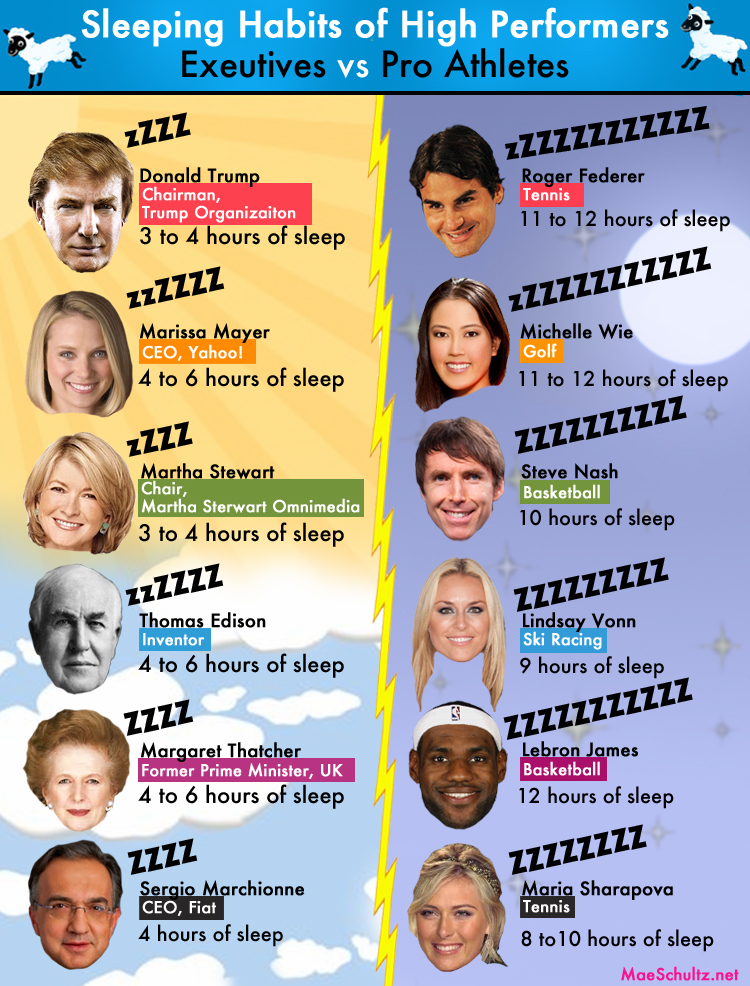By Mae Schultz, first published on MScreative, March 27, 2013.
Have you ever slept off a cold or bad injury? In addition to increasing our mental clarity, reaction time and balancing our hormone levels, sleep is one of our bodies’ most powerful tools for recovery from physical, emotional, and mental stresses. How much should we really be getting? Or, how does culture influence how much we think we can get by with?
Although we have probably all heard that we should get between 6 and 8 hours of sleep each night, corporate professionals striving to gain an edge in the workplace hear a different story. Marissa Mayer, CEO of Yahoo sleeps between 4-6 hours a night, while Donald Trump, Chairman of the Trump Organization sleeps between 3-4 hours each night. The list of business and government leaders with little time for sleep goes on to include important names in history such as Margaret Thatcher, Leonardo Di Vinci and Thomas Edison. It would seem that although medical professionals recommend a solid 6-8 hours of sleep, to truly excel in the workplace, one must work long hours where sleep is a low priority.
If this is true, why do so many elite athletes make sleep the cornerstone of their training? What do they know that executives don’t and what social norms around sleep have influenced the sports industry? Most importantly, what does this mean for the active adults who strive to improve their physical and professional performance?
It turns out that elite athletes and executives have quite a bit in common.
Both need to perform at a high level consistently, therefore their minds must be sharp and resilience to fatigue fairly high. Effective recovery from stress is a crucial component to maintaining this level of performance. Interestingly, the source of stress, whether it’s physical, mental or emotional has the same effect on our bodies. In other words, an athlete who has over trained is about as effective of a burned out executive.
Unfortunately for most of us, there really are some people who function perfectly with a small amount of sleep. They make it look so easy! This is true for athletes as well as executives, but these ‘Sleepless Elites’ only make up about 1% to 3% of the population. Whereas 70% of us get fewer than 8 hours of sleep each night according to the National Sleep Foundation.
For athletes, executives and all the rest of us who fit into that 70% may suffer from headaches, overeating, memory loss, a reduction in growth hormone and higher blood pressure due to their lack of sleep. A recent study from Harvard estimated that the United States loses nearly $63.2 BILLION in lost productivity due to sleep deprivation.
So while we may feel like the longer hours spent on our laptops or phones is giving us a professional edge, we may actually be harming our performance more than anything. Caffeine certainly helps in the short term, but nothing beats a good night’s sleep as the best way to improve overall performance and mental function.
What if business leaders took a tip from Lebron James and utilized sleep as a tool to accelerate their performance?
What if corporate culture exemplified leaders who have gotten to where they are by working harder and smarter than their competition? In some ways, this is already happening. Thanks to research from NASA which found that simply taking a 26 minute ‘power nap’ during the day can increase performance by up to 34% and alertness by 54%. Today, as much as 35% of employees in the US report being allowed to sleep on the clock. Being ‘allowed to’ sleep and culturally encouraging wellness in the workplace can be two very different things, but with any luck getting adequate sleep will become just as widely accepted a tool for improving performance in corporate culture as it has been in professional sports culture.
Sleep on sleepers.
Sources:
Beck, Melinda. The Sleepless Elite. Wallstreet Journal. April 5, 2011.http://online.wsj.com/article/SB10001424052748703712504576242701752957910.html?mod=wsj_share_twitter
Vanderkam, Laura. The Secret of Success: Needing less sleep? CNNmony. March 20, 2012.
Lubin, Gus. Two percent of people are superhumans who don’t need more than a few hours of sleep. Business Insider. April 5, 2011.http://www.businessinsider.com/sleepless-elite-2011-4#ixzz2NHQuvMkr
Cutrone, Carolyn; Nisen, Max. 19 Successful people who barely sleep. Business Insider. September 18, 2012. http://www.businessinsider.com/successful-people-who-barely-sleep-2012-9?op=1
Steve@zeo. How sleeping like a pro can boost your game. Zeology. April 25, 2011.
Schwartz, Tony. Relax! You’ll be more productive. February 9, 2013. http://www.nytimes.com/2013/02/10/opinion/sunday/relax-youll-be-more-productive.html?pagewanted=all&_r=0
About the Author
Mae Schultz is the Marketing Manager at the Personal Training Academy and BioAge. Raised on farm in Minnesota, Mae enjoys the challenge of hard work and harsh elements but chooses to reside in the more temperate climates of San Francisco and Melbourne.



